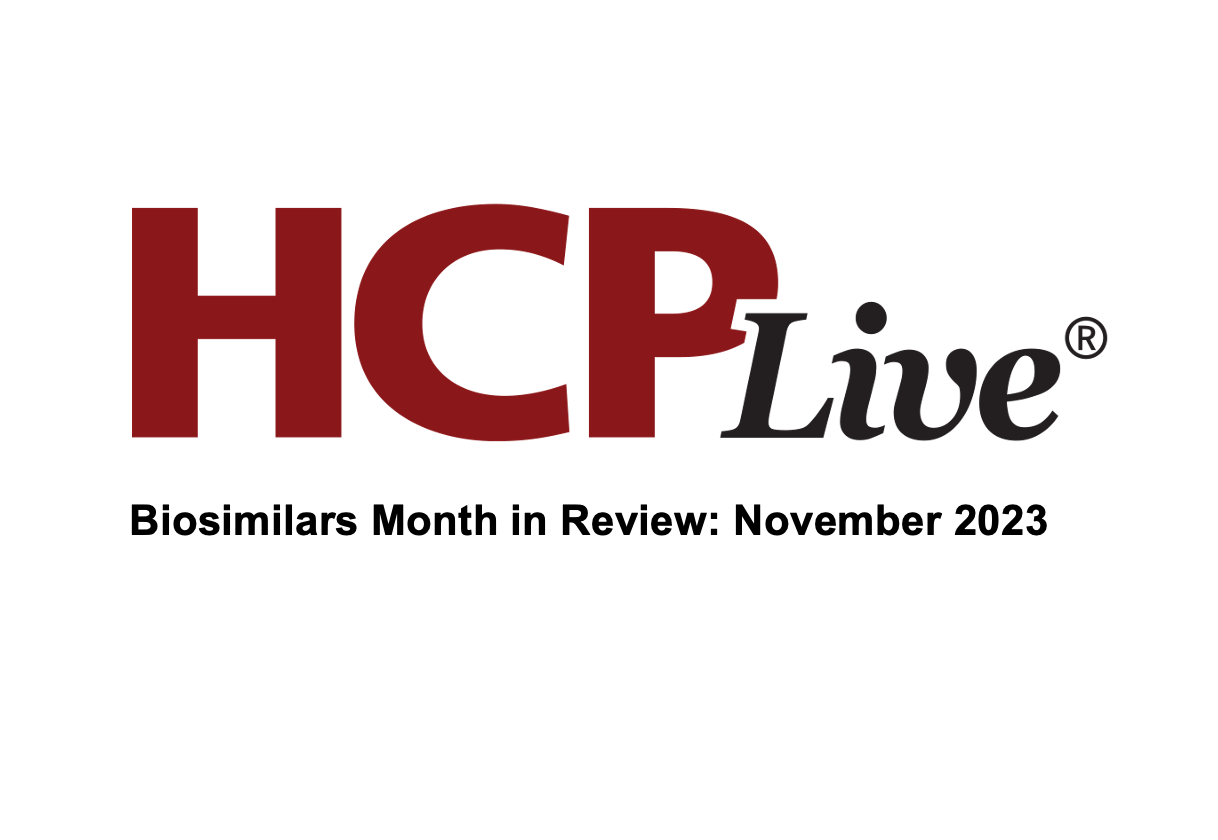News
Article
Biosimilars Month in Review: November 2023
Author(s):
The biosimilars month in review highlights top data demonstrating the efficacy of biosimilars for treating inflammatory bowel disease and plaque psoriasis, as well as trends in adopting biosimilars among patients and clinicians in the US.

The biosimilars month in review highlights top data demonstrating the efficacy of 2 new adalimumab biosimilars for the treatment of inflammatory bowel disease (IBD), the benefits of biosimilars in plaque psoriasis management, and trends in the adoption of biosimilars among patients and clinicians in the United States.
New Adalimumab Biosimilars Show Promise in Inflammatory Bowel Disease
Tumor necrosis factor-α (TNFα) biologics, such as adalimumab, have been widely used to treat inflammatory conditions, including ulcerative colitis (UC) and Crohn’s disease (CD), in Europe and the US. However, the efficacy of the Chinese adalimumab biosimilar, HS016, had not been proven. Similarly, investigators sought to determine whether GP2017 has the same efficacy and safety of reference adalimumab, both in patients naïve to the originator and in patients who switched from the biologic or other adalimumab biosimilars.
Adalimumab Biosimilar HS016 Demonstrates Efficacy, Safety in IBD
Among patients with active CD, most achieved clinical response at weeks 12, 26, and 52 (75.4%, 73.8%, and 50.8%, respectively). Clinical remission was demonstrated in 55.7% at week 12, 65.6% at week 26, and 45.9% at week 52. In the active UC cohort, 37.5% and 50% achieved clinical response at weeks 12 and 26, respectively.
“As research continues, we are confident that increasing biological agents will appear for IBD therapy,” wrote investigators. “Additionally, biosimilars will stimulate competition in the market and have incredible potential to expand patient exposure to biologics in the context of treatment recommendations. Appropriate use of therapeutic drug monitoring (TDM) will provide physicians with a more significant basis for selecting and optimizing treatment.”
Strong Results Observed for Adalimumab Biosimilar GP2017 for Inflammatory Bowel Disease
The research team used a retrospective, multicenter and observational design, conducting their research in Northern Italy at 2 IBD centers: Rho Hospital, ASST Rhodense, and Turin Hospital, Città della Salute e della Scienza, Italy. They involved subjects who had diagnoses of CD or UC who had been given GP2017 therapy for 6 months minimum.
Of the 29 individuals who had begun GP2017 therapy as their first adalimumab, the investigators reported 58.6% were shown to have clinical remission. For the 33 subjects who had had GP2017 as an originator or the 10 who switched from other biosimilars, the investigators found clinical remission was shown to be maintained for 78.8% and 70%, respectively.
The Potential Benefits of Biosimilars in Plaque Psoriasis
This month, results from 2 phase 3 trials evaluating biosimilars for the treatment of plaque psoriasis were announced, including a switch to an adalimumab biosimilar (BI 695501) and a trial assessing the safety and efficacy of the ustekinumab biosimilar, CT-P43.
Switching with Adalimumab Biosimilar Maintains Benefit for Plaque Psoriasis
Research from the phase 3 VOLTAIRE-X trial showed switching from adalimumab reference product to BI 695501 was associated with similar clinical outcomes as maintaining the reference product for patients with chronic plaque psoriasis through 48 weeks. The findings support the prior US Food and Drug Administration (FDA) distinction in approval for the biosimilar last year, when the agency defined BI 695501 as the first “interchangeable” monoclonal biosimilar to adalimumab reference product.
“Based on extrapolation of indications, these results provide rheumatologists, dermatologists, and gastroenterologists with data to support the substitution of BI 695501 for adalimumab reference product in patients with any of the 7 indications for which BI 695501 is approved,” investigators wrote.
CT-P43 Shows Equivalent Efficacy, Safety for Plaque Psoriasis vs Ustekinumab
In the current study, investigators sought to examine the efficacy and safety of CT-P43, a candidate biosimilar, to reference ustekinumab for the treatment of moderate to severe plaque psoriasis.
Results of the phase 3 trial, which included more than 500 patients, provided evidence of equivalent efficacy to originator ustekinumab, with comparable pharmacokinetic, safety, and immunogenicity profiles, in the management of moderate to severe plaque psoriasis in adult patients.
Trends in Biosimilar Uptake
As switching to a biosimilar has become increasingly more common, investigators analyzed data including the switchback rates among a sample of veterans receiving a biosimilar, how a nationwide switch to an adalimumab biosimilar impacted clinicians, and the uptick in trastuzumab biosimilar adoption in the US.
Switchback from Biosimilar to Biologic Rare Among Veteran Patients
In new data from an abstract presented at the International Conference on Pharmacoepidemiology and Therapeutic Risk Management (ICPE) Annual Meeting this year, a team of US-based investigators reported data inconclusive to the notion Veteran patients would primarily switch from a biosimilar product back to its reference biologic product due to a lack of efficacy or safety with the cost-efficient option.
Switching back from a biosimilar to its reference biologic product was not only rare among a cohort of Veterans Affairs patients, but investigators observed there were no distinct trends of rationale as to why a patient would switch back.
Nationwide Switch to Adalimumab Biosimilar Led to Greater Workload, Decreased Satisfaction
Investigators from New Zealand designed an online survey to determine the effect of a mandatory switch to an adalimumab biosimilar. The survey was sent to practicing healthcare professionals including rheumatologists, pharmacists, and nurses specializing in rheumatology.
Overall, the research team reported the switch to the biosimilar, as evaluated by a mean satisfaction score from a scale of 0-10, led to an average rating of about 5.7. The team found providers reported the lowest levels of satisfaction with training involving the biosimilar device, with the information provided from government agencies, and with the administrative work necessary at the time of the transition.
Investigators concluded levels of provider satisfaction were shown to have decreased for elements such as the biosimilar’s safety, its efficacy, the quality of the device, and the availability of alcohol wipes, sharps bins, and support for patients following the change.
Trastuzumab Biosimilar Use Significantly Increasing in the US
An analysis of the utilization of various biosimilars to reference trastuzumab product conducted by a team of US-based academic and industry investigators showed cost-efficient alternatives to the HER2 inhibitor biologic have been increasingly prescribed to patients with relevant cancers since their FDA authorizations 6 years ago
The proportion of total incident episodes using originator trastuzumab biologic decreased from 90% in the pre-biosimilar approval era of 2016, to just 19% in 2021, while biosimilar utilization increased. Additionally, trastuzumab-anns (Kanjinti) increased to 28% use in 2021—a rate similar across patients with and without metastatic disease.





